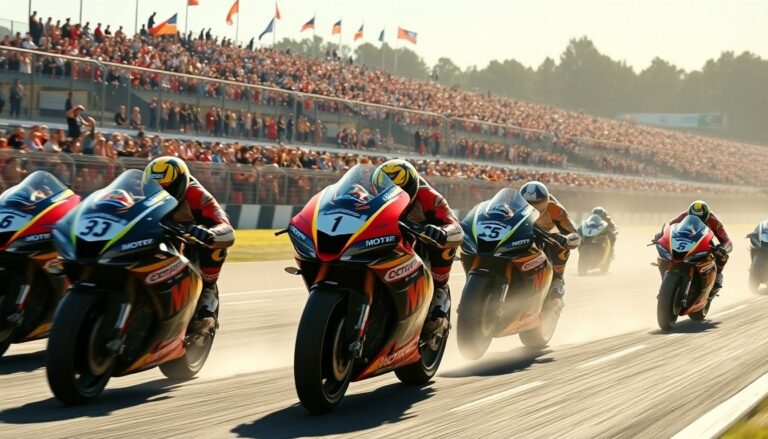Argomenti trattati
The Evolution of MotoGP: A Thrilling Journey
Since its inception in the early 20th century, MotoGP has established itself as the pinnacle of motorcycle racing. This premier class captivates fans across the globe with its unparalleled speed and technical excellence. Each season unfolds a new chapter, showcasing dramatic races, fierce rivalries, and groundbreaking technology that continually pushes the limits of what is achievable on two wheels.
As we delve into the evolution of this exhilarating sport, we will examine its rich history, the technological advancements that define it, and the promising future that lies ahead for MotoGP.
The Rich History of MotoGP
The origins of MotoGP date back to 1949, when the inaugural official championship took place. Since then, the sport has evolved significantly. It has transitioned from traditional road racing formats to the modern, fiercely competitive structure we witness today. A pivotal moment in this evolution occurred in the late 1990s with the introduction of four-stroke engines, which revolutionized motorcycle performance and efficiency.
Key Milestones in MotoGP History
The trajectory of MotoGP has been shaped by numerous pivotal moments. The emergence of legendary riders such as Giacomo Agostini, who secured multiple championships during the 1960s, and Valentino Rossi, a dominant figure in the 21st century, has significantly enriched the sport’s narrative. In the 2000s, the rise of telemetry technology transformed the landscape, enabling teams to analyze data in real-time. This advancement optimized both bike performance and rider strategy. These milestones not only underscore the competitive nature of MotoGP but also reflect its capacity for adaptation and innovation.
Technological Advancements in MotoGP
The essence of MotoGP’s allure is rooted in its unwavering commitment to technological advancement. This sport functions as a premier testing ground for cutting-edge innovations in motorcycle engineering. From advanced aerodynamics to sophisticated electronic systems, every detail is vital for optimizing a bike’s performance on the track.
Engine and Chassis Innovations
The transition to hybrid technology in contemporary MotoGP bikes exemplifies the dedication to sustainability while enhancing performance. Manufacturers such as Yamaha, Honda, and Ducati are making significant investments in research and development to keep their machines at the forefront of competition. Advanced features like anti-lock braking systems and state-of-the-art traction control systems empower riders to maintain control at high speeds, thereby improving safety without diminishing the exhilarating experience of racing.
Data Analytics and Rider Support
The importance of data analytics in motorsport cannot be overstated. Teams are now leveraging big data to scrutinize every facet of a race, including tire wear and fuel consumption. This data-driven approach facilitates rapid adjustments during races, equipping riders with critical insights needed for split-second decision-making. Additionally, the incorporation of artificial intelligence into training programs enhances riders’ skill development, merging real-world experience with sophisticated simulations.
The Fierce Rivalries of MotoGP
No discussion of MotoGP is complete without addressing the intense rivalries that have shaped the sport. The competition among riders transcends mere speed; it involves skill, strategy, and often, personal drama that captivates audiences worldwide. The legendary battles between Valentino Rossi and Marc Márquez not only highlighted their exceptional talent but also fueled a passionate fanbase that eagerly anticipates each encounter.
Building Narratives Through Rivalries
Rivalries in motorsport create compelling narratives that extend well beyond the races themselves. The 2015 season stands out, particularly for the dramatic clashes between Marc Márquez and Valentino Rossi that captivated fans worldwide. These rivalries not only heighten the excitement of each race but also weave intricate stories that keep audiences engaged throughout the season. The passion exhibited by the riders often reflects that of their fans, fostering a unique bond that is essential to the culture of motorsport.
The Future of MotoGP
MotoGP is poised for a future filled with both promise and challenges. As advancements in electric motorcycle technology progress, the sport may soon enter a new era. This shift aims to prioritize sustainability while maintaining the thrill of racing. The introduction of the MotoE championship has already laid the groundwork for electrification in motorcycle racing, demonstrating that speed can coexist with environmental responsibility.
The evolution of MotoGP is marked by its rich history and groundbreaking technological innovations. Fierce rivalries continue to drive the sport, captivating fans worldwide. Looking ahead, it is evident that MotoGP will remain a leader in motorcycle racing, consistently pushing the boundaries of what is possible.

